- Home
- Sherwood Smith
The Thrones of Kronos Page 2
The Thrones of Kronos Read online
Page 2
One, two steps closer. The man on the Throne looked very old, but he sat up straight and tall, as though he belonged there, his body made out of cloudy light. It’s just a holo, she told herself fiercely. That’s what her father had told her. But this man looked like the vids of Jaspar, the first Panarch so long ago, and his eyes reminded her of the Masque’s.
Holos didn’t look at you like that—only people did.
Moira’s pace slowed until she stopped short of the dais before the Emerald Throne. The old man smiled at her and beckoned her closer. She didn’t move; her throat constricted like an invisible hand was squeezing it.
“Who are you? Are you a ghost?” she asked finally. Her squeaky voice was lost in the huge room.
“More than a ghost, less than a man, I think, Moira.” His voice was clear, but soft, so it didn’t echo.
It didn’t surprise her that the ghost knew her name.
“Can you help me?” she asked, carefully setting her basket down at her feet. “The guks saw me.”
“Guks?” the man repeated, smiling just a little.
“What we Rats call the Dol’jharians,” Moira explained, intrigued that he knew her name, but didn’t know what her age-mates in the Mandala called the occupying soldiers. She sneaked a quick look behind her; the big doors were still closed. “They like to kill people, but they’re not supposed to kill any more of us if we don’t break their rules. I broke their rule about anyone coming to this part of the Palace. But it belongs to us! Not to them! I hate them!”
“Aren’t you already breaking a rule?” the man asked.
Moira bent to grab her basket again. Could the man see inside it?
“I’m helping my papa,” she said firmly. After all, that wasn’t a lie. She really was helping her father. Even the Dol’jharians knew that her father was the head gardener and that Moira carried rare cuttings back and forth to his workers, few of whom had full walkabouts—the boundary passes issued by the invaders.
But they didn’t know that underneath the plant slips, buried in the moist soil, Moira sometimes carried message chips.
The man said, “Do you know the difference between breaking a rule that only hurts yourself and breaking one that might hurt many others?”
Moira was silent. Did the ghost know about the chip, then? She’d promised her papa—and the Masque—never to tell anyone about what was in her basket besides plants.
But she knew what he was talking about. The Masque had been careful to explain how no one could use the DataNet anymore, except for business, and the guks read everything. Real messages—like the ones she and her papa tried to send to her mother, maybe hidden with Moira’s dog somewhere on the other side of the world with the other Navy people who’d escaped the first days of killing—went on chips carried from hand to hand. And they were viewed on no-port viewers like the ones the small children used in school: In fact, some of them had come from school, a fact Moira and her friends had found funny.
She said carefully, “You mean that if I don’t carry these plants, somebody might get in trouble?”
He nodded in approval. “That’s just what I mean, Moira.”
Then he thinks I was selfish to come up this way, and not through the service tubes like the Masque told me to do. “I snuck up here because I wanted to see you,” she blurted. “To see if you were real.”
“Why?” the man asked. He was no longer smiling.
Moira struggled with feelings that wouldn’t come out into the right words. Because I hope my mama is still alive. Because my papa drinks every night, until his eyes are red. Because I don’t know if Mama took my dog, when the Navy doesn’t let you have pets, so he could be lost and alone somewhere, and so many of us don’t have our whole families and never will again.
Because the guks are stronger and meaner than any of us. Because there’s gotta be somebody on our side who is stronger than the Dol’jharians.
Somehow she couldn’t say those things out loud. “The other Rats said the Masque saw you,” she said. “They all say that the guks are scared of you, but the Masque isn’t—that he spent a whole night here, and you were with him. I just had to know if any of it was true.”
“It’s all true,” he said.
Moira drew in a shaky breath.
The man smiled again and said, “Who are the Rats?”
“My friends,” she said proudly. “We call ourselves Ratrunners, just like people our age on Rifthaven. We even have a hand code—” She was getting close to breaking promises. And stopped.
“Well done, Moira,” the ghost said approvingly. “You may tell the other Rats that I am here and that I am helping the Masque. However, you must promise not to come this way again—” He turned his head, and Moira’s heart squeezed when she could see right through his skull.
But he smiled, and his eyes bored straight into hers again. “Courage, child,” he said.
And at the end of the room, where she’d entered, the big doors swung open.
Pentasz Sinaran motioned one of his Tarkans inside as the doors began to open. Her shoulders tensed and her face blanched as she looked back from the opening doors at him.
“The little girl is before the Throne. But the . . . it is with her.” Her voice was strained.
The squad commander cursed under his breath, using a term that would have earned him a hundred lashes from Altasz Jesserian. It is not one of the karra, Jesserian had told them. It is a hologram, a computer device.
But the altasz, commander of Dol’jhar’s forces on the Mandala, had never seen the Panarchist karra. And even if it was from the computer, it was still the malevolent will of a dead enemy. What else could you call it?
Now, as the portal widened, he could see it, too. He ordered his squad through the opening doors; despite their fear, they fanned out efficiently, running to take up positions flanking the Throne. A swift crackle of speech from his communicator confirmed Jhustuan’s squad entering via the Aleph-Null Gate behind the Throne.
Fighting down a prickle of numinous horror, Pentasz Sinaran, a twenty-five-year Tarkan, forced himself to advance toward the Throne, his jac held low across his body in the ready position. A ghastly light seeped and whirled through the enormous hall, sharpening to the vivid greenish yellow of a gangrenous bruise. The air had thickened, becoming difficult to breathe. He clenched his teeth as roiling clouds swirled with deadly slowness in a vortex centered above the Throne.
But the fear would not conquer twenty-five years of brutal training and experience. The squad commander did not pause or slow his approach.
Moira was so scared she almost couldn’t feel it anymore, and as the sky filled with clouds like the worst thunderstorm she’d ever seen, she stood rooted by the Throne as the Dol’jharian approached.
Sinaran watched her, too. He could see fear limned in every line of the girl’s body as she retreated across the dais and stood near the Throne, poised for flight. She was almost of an age for her first Karusch-na Rahali, now approaching. Sinaran felt a brief stirring at the thought; like all Dol’jharians, his body never lost the lunar rhythms of his far-off home.
He sternly suppressed the surge. The Panarchists were off limits, and this one was too young and weak, even if she had bled, which he doubted. In any case, his orders were plain, and the girl would never reach the Struggle, if the Panarchists even had such a thing.
He reached the edge of the dais, and tensed his right leg to step up.
“As you value your will and soul, approach no closer,” the karra said in perfect Dol’jharian.
The words stopped Sinaran as though he’d walked into a wall, and he swayed, momentarily off balance. No one had told him it spoke!
The karra gazed steadily at him as the vast hall darkened. Pulses of sound, almost too low to hear, shivered through Sinaran’s body. Light pooled about the karra’s form, flowing in sheets down the Throne, and creeping in waves of dim radiance toward where the Sinaran stood.
He forced his gaze to the karra’s fac
e. Horror choked him at the darkness behind its eyes, wherein flames leapt and flickered.
“My name is Jaspar,” the karra said, and Sinaran knew himself lost. The karra only named themselves to those they ate. “I will not ask yours, for that no longer matters. You have willingly entered my demesne, and you are mine.”
Moira had whimpered in terror as the ghost spoke in the harsh words of the invaders and the soldier stopped, as from above, thunder muttered. The horrible greenish clouds twisted, little points and tendrils of vapor thrusting down from their underbellies, as though they were full of snakes trying to escape.
Sinaran flicked a glance to left and right. The rest of his squad was in position.
“The only question is, do I take you now or later?” the karra said.
Desperation galvanized Sinaran’s muscles, and he jerked up his weapon.
Blasts of deafening thunder made Moira’s ears ring as brilliant blue-white whips of lightning crackled down from the clouds. One struck Sinaran, and a wash of pain like molten metal drilled through every nerve in a net of agony that dropped him into darkness.
Moira keened as he jerked horribly and collapsed. Adult voices screamed beneath the battering blast of sound, then the noise stopped.
Silence.
Moira had fallen to a crouch. Slowly she stood up and looked around. Far off she could see two or three dark bundles on the floor, smoke rising from them. She smelled burned meat and clapped her hand over her mouth as her stomach lurched.
“Are they dead?”
“All except this one,” the ghost said, nodding at the soldier fallen across the edge of the dais.
“You should kill all of them—everywhere,” Moira said fiercely as relief changed her fear to anger.
“I cannot do that alone, Moira,” the ghost replied, smiling faintly. “Even in the Palace, where I could kill those wandering my halls, I must not, or their friends off-planet will come to take their revenge on you. As for this one here, it is better that one should live to spread fear.” He stood up. “But we had best speed you to the completion of your errand.”
A hole opened up right in front of the Throne.
“Do you trust me, Moira?” the ghost asked gravely.
She jerked her head in a nod.
“Then follow me.” He melted and whipped down into the hole, like smoke in reverse.
Moira jumped into the hole and found herself twisting at high speed down a kind of tubular slide, sort of like the Dragon’s Gut ride at the Panludium. She was almost enjoying it by the time she shot out of the bottom in a weird stomach-upping sensation as something turned her upright and set her gently on her feet.
The ghost motioned her on, silent now, and a few minutes later a door opened to reveal the garden where she’d been headed before her detour. She blinked in the unexpected sunlight; she expected clouds and rain, so real had been the storm in the Throne Room.
Moira turned to thank the ghost, but he was gone.
She picked up her basket and set off to make her delivery.
o0o
Ferrasin, the Dol’jharians’ chief noderunner, frowned as he shut down the console. He had just extracted a chunk of exactly the kind of information Barrodagh most prized; why had it come so easily, there at the end of the session? And what had been that burst of activity? The node map he’d laboriously managed to construct had lit up all over.
He looked around his office. It was one of the rewards of his successes at penetrating the secrets of the Palace computer, that vast distributed web of compute arrays encompassing, at times, a fair percentage of the total computing resources of Arthelion. How else could they have ruled the Thousand Suns? There was good reason why the College of Infonetics was based here.
The tianqi whispered, circulating cool air smelling of deep forest and sun-dappled clearings into Ferrasin’s office. A large dyplast pane, roughly set into the wall by his Dol’jharian masters, revealed the bustle of the computer room, muting its sounds to a faint buzz. The other techs could see Ferrasin looking through, but of course no one met his eyes. I’m in as much of a fishbowl as they are, he thought bitterly. But the other noderunners avoided him unless summoned. He was on top here.
In a way.
Mastery of the Palace Net had once seemed a fantasy for a one-time ordinary noderunner. He was good but had begun to lose hope of descending deeper than Octant depths when the Avatar’s hand reached out for him. Dol’jhar’s service had been irresistible, his single chance of reaching his impossible goal.
The longer he labored, the deeper his conviction that his work was producing results well beyond his best efforts—and he had encountered an entity that should have been impossible to conceal. For there was an autonomous intelligence in the Net, wearing the persona of Jaspar Arkad. Ferrasin still found it hard to believe that the Mandala had so terribly violated its own millennial ban against machine intelligence, the deepest-held prejudice of humankind in the Thousand Suns.
And that intelligence had Ferrasin entrapped in a lie. The work that had brought such rapid promotion was definitely no longer his, but that of the intelligence that should not exist; worse, it was an exact accountant of give-and-take. I got some really good information this time. What did I pay for it?
The poing of his console delivered the answer.
“Jesserian here. Come to the Throne Room without delay.” The Dol’jharian commander clicked off without waiting for assent. That, Ferrasin, knew with bitter conviction, was a given.
It must be those chatzing dogs again, Ferrasin thought. Although so far, they’d never peed on anything in the Throne room, there was always a first time. He knew how they got around without detection: though the maintenance crew had had strict orders to close up all the dog doors they found, the computer kept re-establishing them. Just as its housekeeping nodes regrew the functions furnishing food and water for the animals. The question was, why?
Ferrasin laughed at himself as he toiled down the peaceful hallways. Dogs bred here for centuries would know every corner of the Mandala. As for ‘why,’ they were just dogs. Way down at the computer’s lower strata, there probably existed some programming order that there should always be comestibles and access for the animals. It might even go all the way back to that first Jaspar Arkad, if the history chips taken from the local school were right.
Thinking about that computer… artifact (he hated how his mind slid from ‘intelligence’), plus listening to those Tarkans and their never-ending talk of ghosts, had made him more credulous than he’d ever thought possible.
His mood had regained its normal exasperation when he entered the Throne Room. But the first whiff of charred meat banished his self-assurance. Ferrasin fought waves of nausea as he watched grim-faced Tarkans gingerly carry the mushy, well-cooked remains of their fellows out of the Throne Room.
Ferrasin listened in horror as the sole survivor, on his feet in a rigid posture marred by a tendency to sway, related what had happened.
“How was this done?” Jesserian swung around and glared at Ferrasin.
Ferrasin swallowed the metallic taint creeping up his throat. I won’t throw up! he thought as he mentally reviewed his knowledge of sims. “I’d guess ch-ch-charge toroids in the ceiling, w-w-with a UV laser to trigger the discharge.” Of course his stutter would be worse than ever.
The Dol’jharian glared at him.
“Artificial lightning,” Ferrasin said, abruptly weary. “Th-the Kyriarch Banicalaan was a sim fanatic. Sh-she even used t-t-to make it rain and snow in here. The machines haven’t been used for several centuries.”
“And they still work?” Jesserian was openly scornful.
“No reason why not, if the computer’s taking care of them.”
The commander turned away and dismissed the Tarkan survivor with a few harsh phrases. The man saluted; the tech saw the pain in his face as he pivoted smartly, stumbled, and marched away. They were alone on the dais. The voices of the death detail faded to a chorus of whispered echo
es as they departed.
Jesserian stepped up close to Ferrasin, towering over him. His body odor was rank, that of an exhausted man running on nervous energy. “This is your responsibility. You must control the computer.”
The tech heard a faint catch on the initial consonant of the last word. Jesserian had been about to say “karra,” no doubt. Amusement spurted behind Ferrasin’s ribs, though enough fear remained for him to keep it under strict control. For different reasons, the Dol’jharians were as upset by the intelligence as he was.
“I c-can’t control it,” he replied. “And I w-warned you not to let Tarkans into the Throne Room. Anyway, you know as well as I do that one can only bargain with it, unless we destroy it utterly. And if we do that, we will both be destroyed.”
Jesserian snarled a Dol’jharian curse, but Ferrasin heard in that an acknowledgment of his words as truth. Just as much as Ferrasin, the commander owed his present position to the computer. In the months since Eusabian had left, it had always delivered barely enough information through Ferrasin to enable Jesserian to avoid the disasters that had ended the careers of his rank equals here on Arthelion. Now he, like Ferrasin, was supreme in his sphere.
“But now there are no more kah-jillalch,” the Tarkan said. “Scapegoats,” he added, apparently seeing Ferrasin’s puzzlement. “So your . . . haunting has our progeny in its teeth. Can you deliver enough to Barrodagh to convince him to avert the Avatar’s wrath?”
Ferrasin smiled. “If he w-w-were not a Catennach, I w-would say that I have Barrodagh’s progeny in my teeth.”
Jesserian gave a short bark of laughter and looked at Ferrasin appraisingly. “You have changed much since the Avatar’s departure. You still would not fare well in the Karusch-na Rahali, but you are learning Dol’jharian ways, it seems.”
“I enjoy breathing.”
Jesserian gave that odd, twisting nod that characterized the Dol’jharians. Then his expression tightened into its normal somber expression. “So do I, although that could change.”

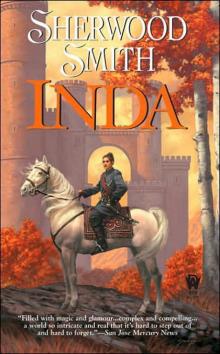 Inda
Inda Danse De La Folie
Danse De La Folie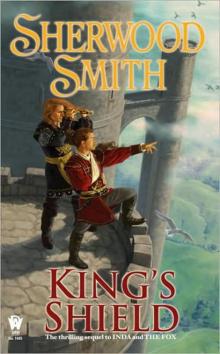 King's Shield
King's Shield Whispered Magics
Whispered Magics Fleeing Peace
Fleeing Peace Barefoot Pirate
Barefoot Pirate Crown Duel
Crown Duel Mearsies Heili Bounces Back
Mearsies Heili Bounces Back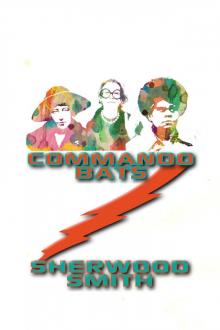 Commando Bats
Commando Bats A Stranger to Command
A Stranger to Command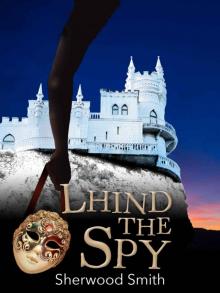 Lhind the Spy
Lhind the Spy The Spy Princess
The Spy Princess Blood Spirits
Blood Spirits Sasharia en Garde
Sasharia en Garde Lhind the Thief
Lhind the Thief Paradise Drift
Paradise Drift Banner of the Damned
Banner of the Damned The Trouble With Kings
The Trouble With Kings Poor World
Poor World Treason's Shore
Treason's Shore Wren Journeymage
Wren Journeymage A Posse of Princesses
A Posse of Princesses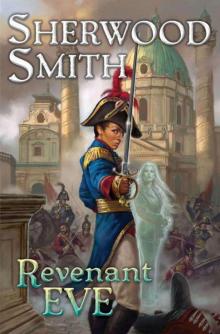 Revenant Eve
Revenant Eve Once a Princess
Once a Princess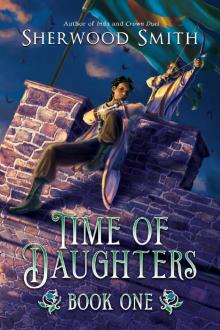 Time of Daughters I
Time of Daughters I Rondo Allegro
Rondo Allegro Coronets and Steel
Coronets and Steel Over the Sea
Over the Sea Senrid
Senrid Hunt Across Worlds
Hunt Across Worlds A Sword Named Truth
A Sword Named Truth The Fox
The Fox Twice a Prince
Twice a Prince Fair Winds and Homeward Sail: Sophy Croft's Story
Fair Winds and Homeward Sail: Sophy Croft's Story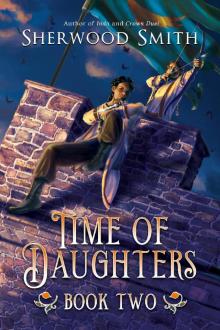 Time of Daughters II
Time of Daughters II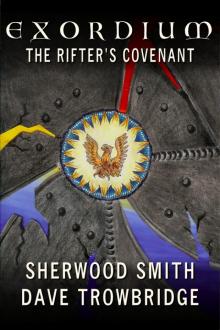 The Rifter's Covenant
The Rifter's Covenant The Phoenix in Flight
The Phoenix in Flight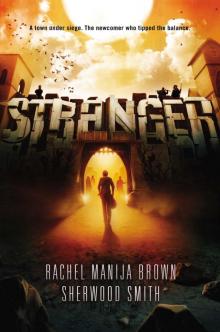 Stranger
Stranger The Thrones of Kronos
The Thrones of Kronos A Prison Unsought
A Prison Unsought Twice a Prince: Sasharia En Garde Book 2
Twice a Prince: Sasharia En Garde Book 2